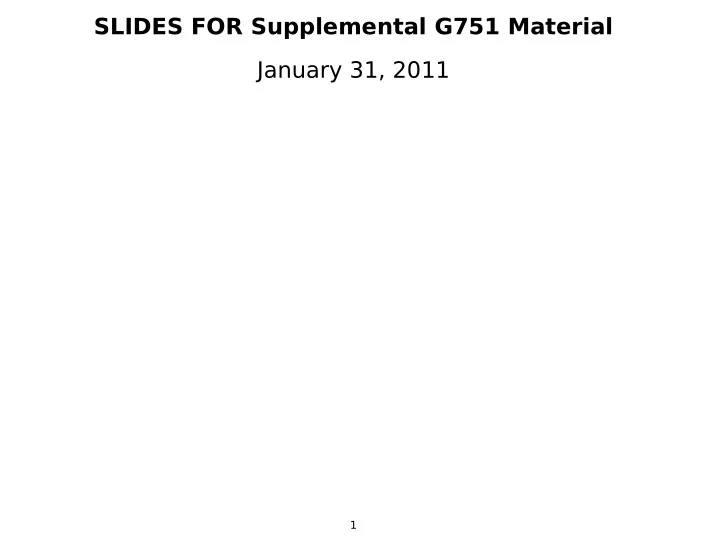

SLIDES FOR Supplemental G751 Material January 31, 2011 1
Students often think that if they write something down, it has to stay in the paper. Be prepared to consign that paragraph to the dustbin, to complete annihilation. Any word that cannot justify its existence must die. 2
Reading your paper out loud is the best way to catch awkward phras- ing and typos. 3
A common vice of theorists is this trick of phrasing: “The price is high (low) if the quantity is low (high).” How quickly can you understand that statement compared to, “The price is high if the quantity is low. The price is low, on the other hand, if the quantity is high.” That is why I didnˇ Redundancy helps people read faster. St write “Rdnncy hlps pple rd fstr”, even though the condensed sentence is precise, unambiguous, and short. Try to find one concrete illustration to carry through the paper, using that illustration to explain the mathematical propositions. “The more abstract the truth is that you would teach, the more you have to seduce the senses to it. (Nietzche) 4
Number each page of text so the reader can comment on particular pages. Number each equation in drafts on which you want comments. 5
The title page should always have (1) the date, (2) your address, (3) your phone number, and (4) your e-mail address. 6
A paper over five pages long should include a half-page summary of its main point. Write your paper so that someone can decide within three minutes whether he wants to read it. 7
References to books should be specific about which part of the book is relevant. Give the chapter or page number. Give 1776 as the year of Smithˇ Ss work, not 1952. 8
“Density” is a much better name than the unpronounceable and mysterious “POPSQMI.” Use words as well as numbers, or instead of them. Say “Because of the differentiability assumption (A2)...,” not “Because of (A2)...” William Thomson: “The argument that numbers and abbreviations save space is not very convincing given that they will not shorten a 20-page paper by more than five lines, and they certainly will not save time for your reader.” 9
When I was a student at MIT, Peter T emin told us that presentations have three purposes: (1) to tell something to people, (2) to get comments, and (3) to impress the audience. Get your meaning across first. Only then should you defend your assumptions. 10
Write out the introduction word for word. This will help you get over the nervousness of starting to talk. 11
Answering questions is more important than reaching the end of your talk. If you rush the talk, few people will understand the last part anyway. Think of the talk as a gathering of people to discuss your work for 90 minutes, not as a gathering of people to hear you read 33 pages of an article. 12
When someone asks you, “Why did you make Assumption X?” do not answer, “Because thatˇ Ss standard in the literature.” 13
Unless your audience has the entire paper, you should distribute at least a one-page handout. 14
The speaker who only looks at his watch after an hour and then speeds up to cram everything into his time slot is a fool. Look at your watch early, and you will be able to choose which parts to rush through. Do not think, “I have an hour left, so I have plenty of time.” Many a seminar—especially many a student seminar—is severely be- hind after the first half hour. 15
If the host asks if you have any closing remarks, that usually means you should have finished five minutes ago. He does not really want closing remarks; he wants you to stop. Your reply should be either (1) “No, I do not have any closing remarks. Thank you,” or (2) Three sentences summarizing the main results; or (3) a closing joke. 16
Martin Luther said, “There are three things, so to speak, which every good preacher should do: First, he takes his place; second, he opens his mouth and says something; third, he knows when to stop.” The first rule of speaking is to finish on time! 17
Recommend
More recommend